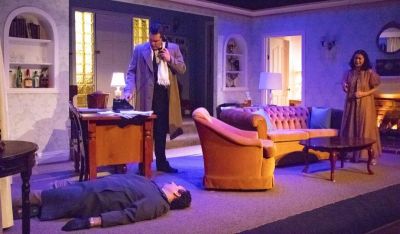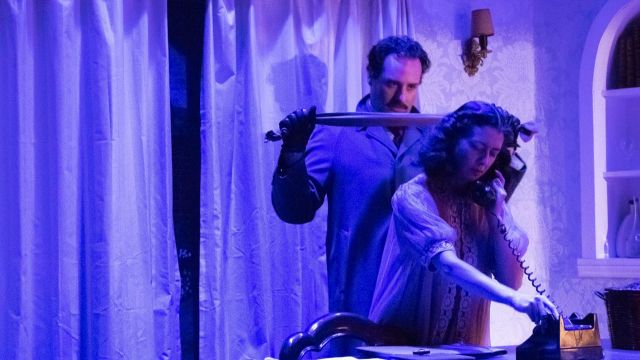Dial M for Murder
Dial M for Murder, written by Frederick Knoff and bought to mainstream populace by Alfred Hitchcock, is a tale of a spiteful and vindictive husband seeking revenge on his cheating wife.
Tony Wendice, ex tennis star turned model husband, discovered that whilst he was competing in an overseas tennis competition, his wife, Margot, was having an affair with TV writer Max Halliday. Following up on a devious plot to incriminate his wife, he surreptitiously crosses paths with an old school mate, now expert con man. Through Tony's sinister ways, he blackmails Captain Lesgate into murdering his wife. But not all goes to plan. Now Tony needs to find a different way to get rid of his wife and gain access to her fortune.
Justin Stephens convincingly plays Tony. His bodily and facial expressions were snide and cruel, allowing the audience to dislike him with an intensity to his demeanor. Stephens is certainly comfortable on the stage and was at ease with this characterisation.
As his devoted wife, Angeline Thompson beautifully portrays Margot. A tough role to play, since it is epitomised by the stunningly talented Grade Kelly in the film version. Thompson makes the role her own as she swings trustingly from her husband to Max and back again (and back again). Her emotional state after her attempted murder (I'm not quite sure why the director felt the need to use vocal sfx over the scene) could have been heightened, but the audience were enamoured by her consistent performance.
 Normally more comfortable with comedy (as his biography states), Allon Dinor was perfectly cast as Captain Lesgate. He fit into the role with ease and was a nice contrast to Stephens’ character.
Normally more comfortable with comedy (as his biography states), Allon Dinor was perfectly cast as Captain Lesgate. He fit into the role with ease and was a nice contrast to Stephens’ character.
Set and lighting were very naturalistic and helped to convey the early 1950s setting. Music utilised was directly from the film version. Costumes were not as polished as I had hoped, some ill fitting clothing, especially on Thompson, didn't quite capture the opulent lifestyle that they live.
The use of multi media for cross scenes was something new for the 1812 Theatre and was utilised well in their proscenium arch stage.
On the night that I went, there was a lot of missed or messed up dialogue that disrupted the flow of the play. English accents were inconsistent and time needed to be spent perfecting these for plausibility.
Overall, a good season for the 1812 and will be loved by their devoted audience base.
Penelope Thomas
Subscribe to our E-Newsletter, buy our latest print edition or find a Performing Arts book at Book Nook.

